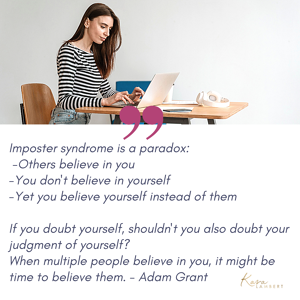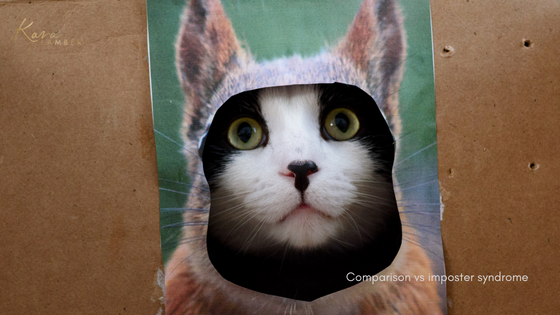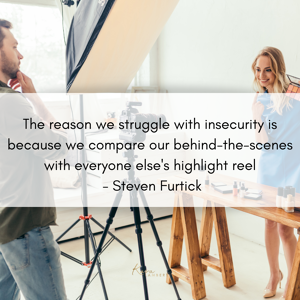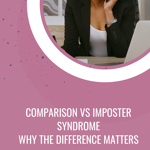I’ve been thinking a bit of late about comparison and imposter syndrome. I’ve noticed that in some circles, the terms are used interchangeably. To be honest, they are closely linked but I don’t see them as interchangeable. So, I wanted to address how I see how comparison vs imposter syndrome. Please remember that everything I do is taken from a psychology perspective.
Definitions of comparison vs imposter syndrome
When I think of comparison, I think of what psychologist term ‘social comparison’. Social comparison is where we compare aspects of ourselves (behaviour, abilities, emotions, business) to others so that we can better assess ourselves.
Imposter syndrome is a fear of being found out as being a fake, fraud, or phony. Where, despite evidence, we believe that we do not deserve the success we have. Imposter syndrome includes downplaying one’s abilities (often then attributed to luck) and at the extreme berating our abilities. Some individuals will sabotage their success (procrastination, avoidance, setting inappropriate goals). Imposter syndrome can also include a fear of not living up to expectations, your own or perceived expectations of others.
Comparison 
I see comparison as being externally controlled or driven. We are looking at someone or something else and comparing where they’re at to where we are or believe we should be. Where it can blur is when this comparison then starts a spiral into imposter syndrome – especially when we berate our abilities based on the comparison.
Imposter Syndrome
I see Imposter Syndrome as an internally controlled or driven thought process. Even the fear of not living up to others’ expectations is internal as they are not actual expectations in Imposter Syndrome, instead they are what we believe/think others are expecting of us.
Why the distinction matters
I’ve always believed that words have power. They are also nuanced. They can create or mend division. In this instance the difference is nuanced. I hope the definitions above have shown you a little of the difference.
The other part to this is how to handle the behaviour that leads to comparison or imposter syndrome. (and I do struggle with both at one time or another) It’s one thing to know that it’s how you react to others that’s causing you grief, it’s a whole other scenario when it’s all within how you perceive and value your own actions and abilities.
Handling comparison in business
I’ve written a few times about comparison in business:
- Swimming in a blue ocean
- The comparison gremlin
- FOMO & comparison
- Comparison vs competition
- Comparison & how we let others control our business
- Comparison & negative self-talk
- Comparison & burnout
- How to let go of a fear of judgment
- Reminder: Your effectiveness in Small Business is NOT a reflection of your competitors’
There are a few core pieces to tackling comparison. Firstly, is to remove the temptation, which is actually fairly straightforward if it occurs online. The next is to realise that what you’re seeing/being told/comparing to may only be a small portion of the reality; so you’re comparing apples and oranges. Then it’s to question if that’s what/where/how you want to be.
Comparison is fine if it helps us to grow. Unfortunately, most of us don’t look at it this way. This is why I wrote the following blog posts:
- Feeling secure in yourself as a protective factor for comparison
- Reduce comparison and help feelings of overwhelm
Handling Imposter Syndrome in business
I’ve written a few posts on Imposter Syndrome:
- 3 unlikely ways to make your business more profitable
- 4 lessons I learnt from building my confidence as a business owner
- What over five years as a business consultant has taught me about self-reliance
- 10 ways to stop feeling overwhelmed
- Balancing Type-A personality as a business owner
- 5 reasons why small business owners don’t follow up potential leads (that you probably don’t know) & how to avoid the trap
- Origins of negative self-talk
- My path to recover from burnout
- How I overcome Imposter Syndrome when public speaking
- Why it’s important to overcome imposter syndrome
- How to overcome imposter syndrome in business
When I looked through my files, I had written over 20 blogs since January 2020 that referred to Imposter Syndrome. I do find it’s a common theme among my clients.
Syndrome. I do find it’s a common theme among my clients.
There were also a few posts about comparison that also included Imposter Syndrome, so please scroll back up to that list and check some of them out.
The central theme of overcoming imposter syndrome is tackling the story we tell ourselves about our abilities and why we believe we will be caught out or hold ourselves to false expectations.
How comparison and imposter syndrome “work” together
Incidentally, I often see clients who start in a place of comparison and then transfer to one of imposter syndrome. It can go along the lines of “I’m nowhere near as good as XYZ, in fact I’m not really much good at all, it’s only a matter of time until I’m caught out as a fake”. Ok, so that’s an extreme simplification of the thought process but I hope you can see how it would progress. I also hope that you can see how easy it is to use them interchangeably.
Where to from here with comparison and imposter syndrome?
My aim is for those who do find themselves struggling with both comparison and imposter syndrome that they know that they are not alone and that each have their own methods of management. I want you to know that it’s ok, you’re not always going to get it right and sometimes it might be harder than others to come through it. I want you to know that I have tools here for you, the blogs I mentioned above, my resource page, my toolkit, and time with me to unpack your story. I want you to know that this can take time but it is worthwhile. Please contact me with any questions you may have, I am here to help you.




[…] coach Kara Lambert factors out that the previous is caused by exterior elements, whereas impostor syndrome (emotions […]
Thank you for linking to this article.
[…] coach Kara Lambert points out that the former is brought about by external factors, whereas impostor syndrome […]
[…] coach Kara Lambert The former is caused by external factors, while imposter syndrome (feelings of inadequacy and […]